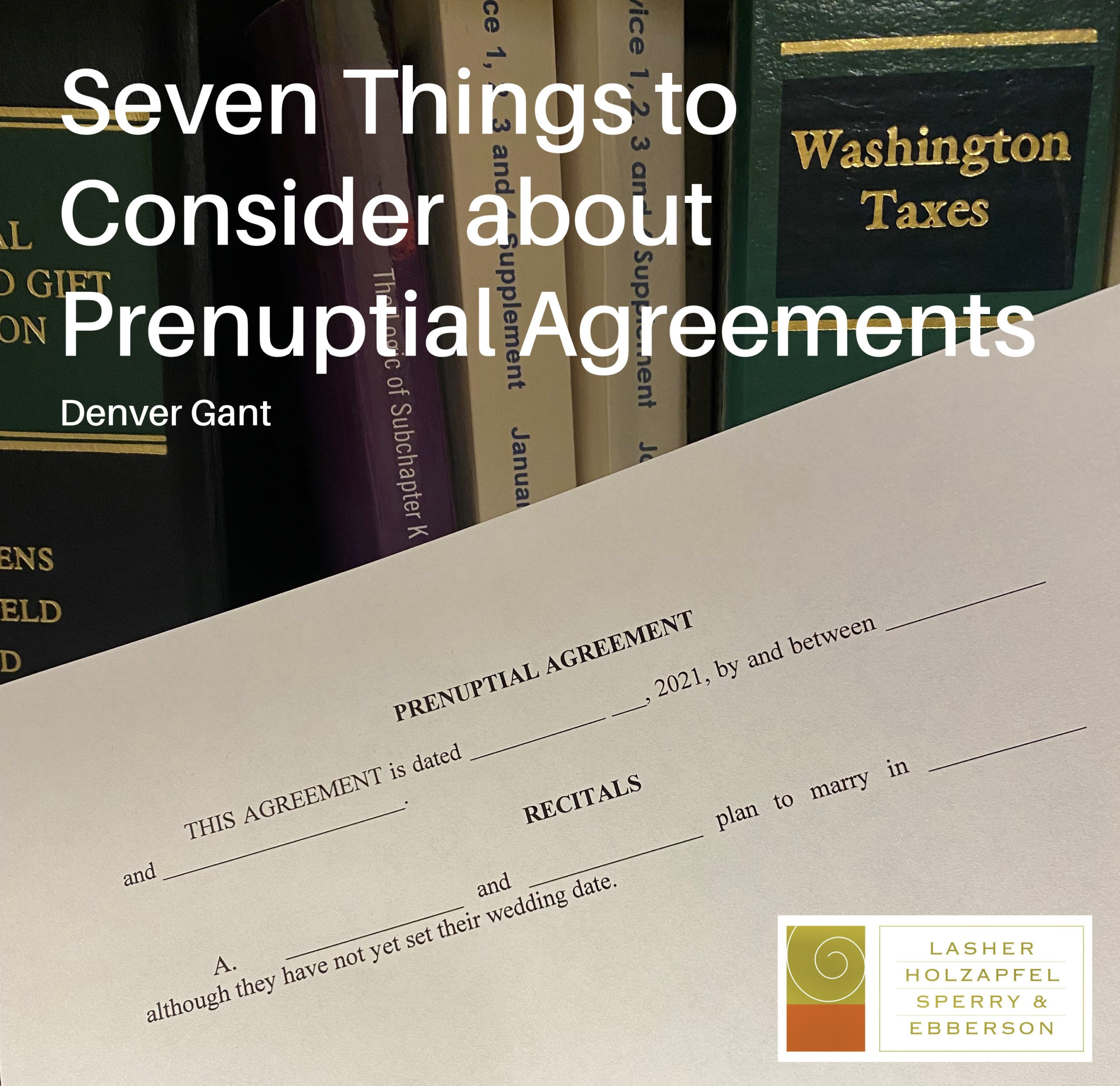Seven Things to Consider about Prenuptial Agreements

Posted on November 29, 2021 by Denver Gant
Prenuptial agreements (prenups) are no longer the sole domain of the rich and famous. There are many reasons why more couples consider one as they enter into marriage. Each prenup is tailored to the needs, desires, and circumstances of the parties involved. What follows are some common factors to help you determine whether you would benefit from a prenup.
1. Fairness is Key, Particularly Substantive Fairness
The goal of a prenup is to create an enforceable agreement that protects the respective interests of each party and sets expectations about the division of property when the marriage ends, whether due to death or divorce. In Washington, the Court will apply a two-pronged analysis to determine whether a prenup is enforceable. The first prong evaluates whether the prenup is substantively fair to the spouse contesting the prenup’s enforcement Substantive fairness involves an analysis of the following non-exclusive factors: (i) the proportional benefits of the prenup between the spouses; (ii) restrictions on the creation of community property; (iii) limitations on the accumulation or prohibitions on the distribution of separate and community property in a dissolution; (iv) the economic means of each spouse; (v) preclusion of rights to both community and separate property in a dissolution; (vi) limitations on inheritance rights of the spouses; and (vii) prohibitions on awards of maintenance payments to the lesser-earning spouse in a dissolution. A prenup should treat both spouses fairly when signed, but also keep an eye towards treating them fairly in the future. If the prenup is “substantively fair,” it is likely to be enforced.
2. Both Sides Should be Represented by Attorneys
The second prong of the analysis evaluates whether the prenup is procedurally fair. One key aspect for procedural fairness is whether spouses were represented by separate attorneys. Prenups alter default property rights the parties would have in the absence of such an agreement. Those rights may include, but are not limited to, the creation, ownership, management, and disposition of community, quasi-community and/or separate property during the marriage, upon divorce, or at death; rights to spousal maintenance or payment of expenses; or inheriting property if a spouse has no will. It is difficult for a lay person to be aware of and understand how prenup terms may impact or alter those rights. Attorneys help to ensure both spouses understand and negotiate to protect their rights. If the spouse with lesser means cannot afford one, the other spouse should give serious consideration to reimbursing or paying for both attorneys, however the lesser-means spouse should be free to use the attorney of his or her choosing.
3. Full Disclosure of Assets and Liabilities
Another aspect of procedural fairness involves the evaluation of whether the spouses made full disclosure of the amount, character, and value of their property. It is difficult to negotiate for fair and reasonable terms without the full disclosure of both spouse’s assets and liabilities. The failure of one spouse to disclose assets deprives the other of the ability to negotiate for different rights, which risks the enforceability of the prenup. The disclosure should include the spouses’ incomes, frequently in the form of tax returns. For prenups, there is no such thing as too much disclosure.
4. Timing is Important
The final aspect of procedural fairness deals with timing. A prenup is not a last second suggestion. Courts in Washington will look to the timing of the exchange of drafts and when the prenup is signed if one of the spouses challenges its enforceability. The rationale is to allow both parties time to evaluate the rights and assets they intend to allocate, and to avoid a pressure-filled situation that calls into question whether both freely and voluntarily entered into the prenup. For example, a prenup presented the day before the wedding to the lesser means spouse in a “sign it or the ceremony is off” situation raises a host of fairness risks. The goal should be a final, executed prenup at least three to four months before the wedding ceremony. Less time is not necessarily fatal, but it raises an enforceability risk in that one party may feel coerced into signing the prenup. At that point, a postnuptial agreement may be the better option.
5. Not Just for Wealth Disparity
While differences between the spouses’ wealth is one of the primary reasons for a prenup, it is by no means the only one. A prenup can set expectations and provide a spouse who experienced a contentious divorce with comfort that the second one, if it happens, will not be a repeat of the first. A prenup can protect property for children or grandchildren one or both spouses bring into the marriage. A prenup may also be appropriate where one spouse faces past or future debts or liabilities that could become liabilities of both. If a spouse brings a business into the marriage, a prenup can help to protect it from division or joint control in the event of a divorce.
6. Strict Adherence to the Prenups Terms
Once married, the spouses should strive to strictly adhere to the prenup terms or risk inadvertent termination. For example, if a spouse negotiates to treat her wages as separate property, but commingles the wages in a community property account, a court or spouse may consider those actions as evidence of an intent to create community property instead of following the prenup terms. In light of this, it is critical that the provisions of a prenup be strictly followed.
7. Follow-Up After the Ceremony
Spouses frequently need to take additional steps after the wedding ceremony to comply with the terms of a prenup. It is common for spouses to make gifts, bequests, or grant certain rights to the other at death. This will require revising existing estate planning documents. For example, the spouse who brought a separate property house into the marriage needs to state in their will that the surviving spouse may stay in the house, or the survivor may be forced out shortly after death. Many nonprobate assets, including life insurance, individual retirement accounts, and 401(k) plans, protect spouses from inadvertent disinheritance. If the spouses negotiated to leave a portion of those assets to anyone other than the surviving spouse, the non-owner spouse will need to consent to this arrangement after the wedding ceremony. This is commonly accomplished through updating beneficiary designation forms for those assets.
The Estate Planning and Family Law Attorneys at Lasher Holzapfel Sperry & Ebberson PLLC are available to help you evaluate whether a prenuptial agreement may be helpful as you prepare for your upcoming wedding.

